Key takeaways
- Descartes employs methodic doubt to challenge assumptions, urging a deeper inquiry into personal beliefs.
- The principle “Cogito, ergo sum” emphasizes self-awareness as the foundation for understanding existence.
- Engaging with philosophical texts through close reading and personal reflection enhances comprehension and meaningful dialogue.
- Applying Descartes’ ideas today encourages critical thinking and a more thoughtful approach to knowledge and identity.
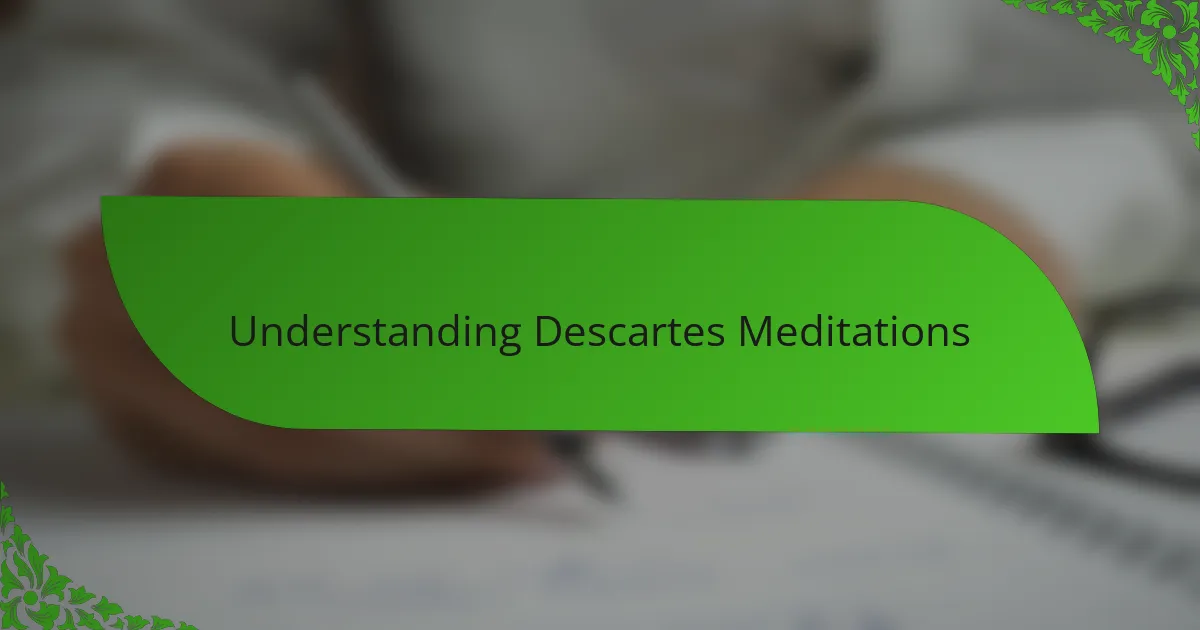
Understanding Descartes Meditations
When I first dived into Descartes’ Meditations, I was struck by how profoundly personal the journey felt—like peering into the mind of someone wrestling with doubt and certainty. Have you ever questioned everything you believed to find what’s truly certain? Descartes guides us through that process with a methodical skepticism that challenges our assumptions.
I found that understanding his meditations isn’t just about following logical steps; it’s about embracing a mindset of inquiry. It made me reflect on my own beliefs and how often I accept ideas without scrutiny. This made the text feel alive, almost like a conversation rather than a dry philosophical treatise.
What makes Descartes’ work enduring, in my view, is how it turns the abstract into something personal and urgent. His search for absolute truth isn’t distant philosophy—it mirrors the questions we all face about knowledge and existence. That’s why understanding his meditations feels like embarking on a shared intellectual adventure.
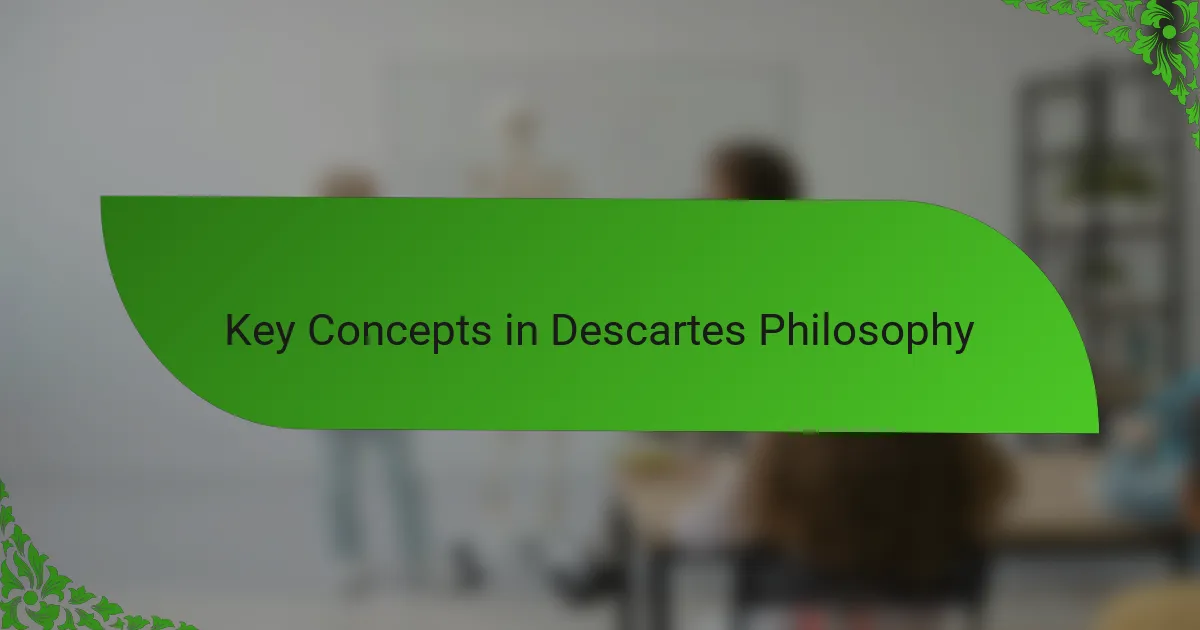
Key Concepts in Descartes Philosophy
Descartes’ philosophy revolves around a few core concepts that shook my understanding of knowledge. The idea of “methodic doubt” really stood out to me — he deliberately questions everything he thought he knew, even the existence of the physical world, to find what is absolutely certain. It made me ask myself, what beliefs do I hold without questioning their foundation?
One concept that felt especially powerful was the famous “Cogito, ergo sum” — “I think, therefore I am.” This simple yet profound realization became the anchor point in Descartes’ quest. I found it fascinating how the mere act of doubting proved his own existence, and it got me thinking: if thinking is proof of being, how deep does our self-awareness go?
Another key idea is the distinction between mind and body, what we now call dualism. Descartes argues that the mind, a thinking, non-material substance, is fundamentally separate from the body. This raised some personal questions for me about where consciousness truly resides—are we just our thoughts, or is there something more that connects us to the physical world?
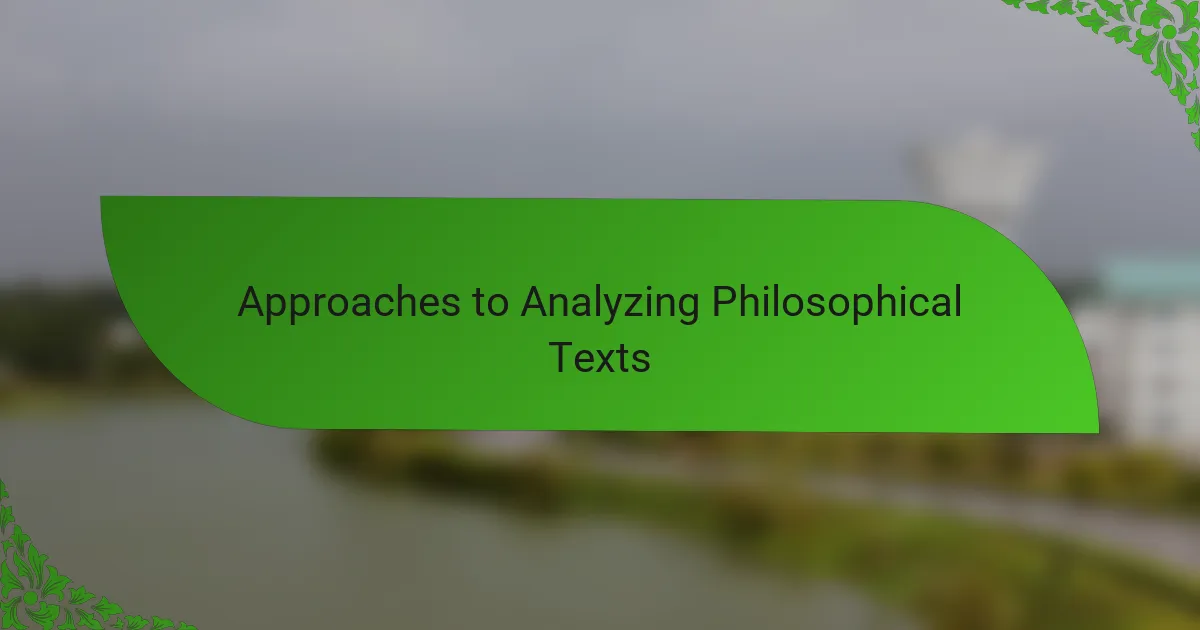
Approaches to Analyzing Philosophical Texts
When I analyze philosophical texts like Descartes’ Meditations, I often start with close reading—carefully unpacking each sentence to grasp the precise meaning. This method helped me catch nuances I might have missed on a casual read, revealing the layers of thought beneath his words. Have you ever noticed how a single phrase can open up an entire web of ideas when you really lean into it?
Another approach that resonated with me involves looking at the historical and intellectual context. Understanding the backdrop of Descartes’ time—the skepticism of the scientific revolution and theological debates—gave me a richer picture of why his methodic doubt was so revolutionary. Context, for me, is like the seasoning that makes the philosophical flavors more distinct and relatable.
Sometimes, I find it useful to engage in a kind of dialogue with the text, almost debating with Descartes or playing devil’s advocate against his arguments. This active engagement transformed reading into an interactive process, making abstract concepts feel alive and urgent. Have you tried questioning a philosopher directly while reading? It changes everything.
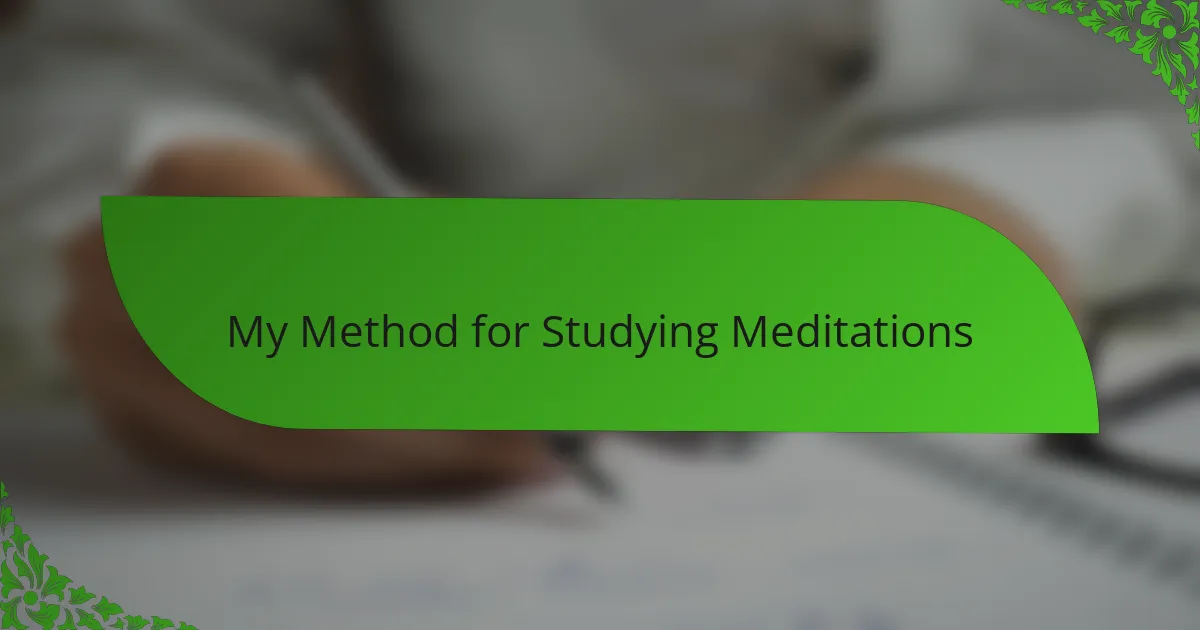
My Method for Studying Meditations
To study Descartes’ Meditations, I began by breaking down each meditation into bite-sized sections, taking my time to reflect on what each passage meant to me personally. This slow digestion allowed me to catch the subtle shifts in his reasoning that I might have skimmed past otherwise. Have you ever had that moment where a single sentence suddenly unlocks an entirely new understanding? That’s the kind of experience I targeted with this method.
I also kept a journal alongside my reading—a place to jot down my immediate reactions, doubts, and even frustrations. Writing things out helped me clarify my thoughts and made the process feel less like deciphering an old text and more like an ongoing conversation with Descartes himself. It turns out that wrestling with the ideas on paper deepened my grasp far more than passive reading ever could.
What really solidified my study was revisiting the meditations multiple times over weeks. Each time, I noticed new questions rising up, or a different angle on his arguments I hadn’t seen before. Isn’t it fascinating how returning to a text can make it feel fresh and alive each time? This cyclical approach helped me internalize his methodic doubt, making it more than an academic exercise—it became a way of thinking.
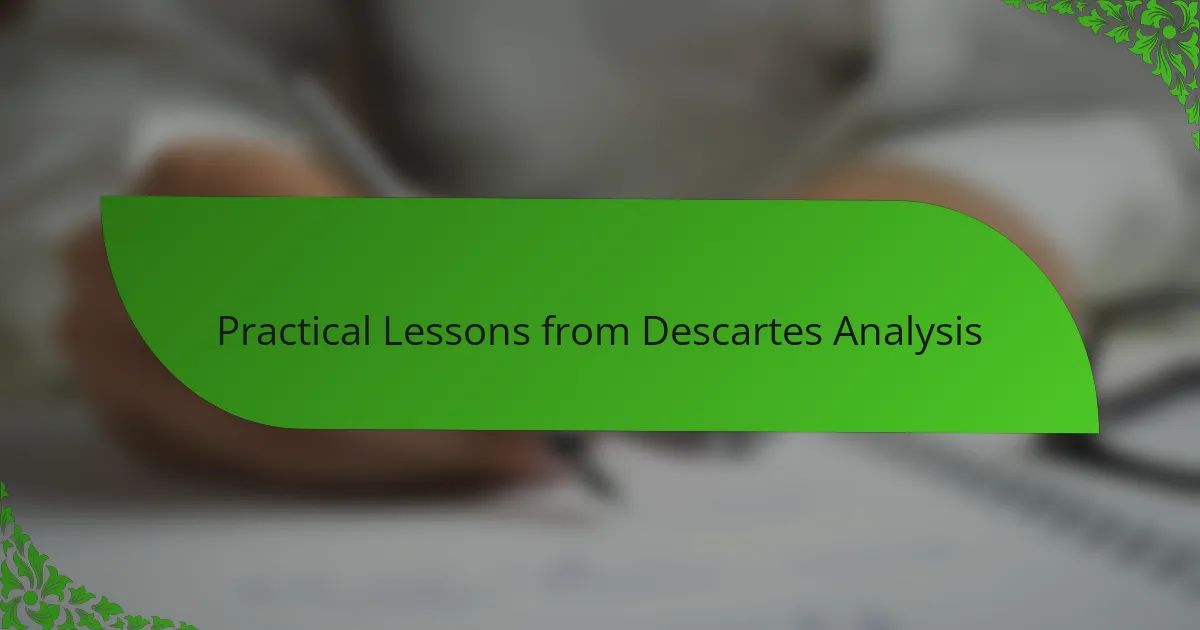
Practical Lessons from Descartes Analysis
One practical lesson I drew from analyzing Descartes is the power of embracing doubt as a tool rather than a roadblock. When I allowed myself to question my most basic beliefs, it felt unsettling but also strangely liberating—as if clearing fog to see the landscape beneath. Have you ever experienced that mix of discomfort and clarity when you challenge something you once took for granted? That tension, I believe, is where real insight begins.
Another takeaway is the importance of grounding our understanding in what’s undeniably certain—in Descartes’ case, the simple act of thinking proves existence. Applying this, I found myself seeking firmer foundations in daily decisions and ideas, rather than sliding into assumptions or convenience. It changed how I approach problems: start from what you know beyond doubt, then build thoughtfully from there.
Lastly, I realized how separating mind from body invites us to reflect deeply on consciousness and identity. Wrestling with this dualism sparked personal questions about how I experience the world—am I merely a thinking mind, or is there more woven into my sense of self? This wasn’t just abstract philosophy; it became a meaningful inquiry into how I relate to my own existence and others around me.
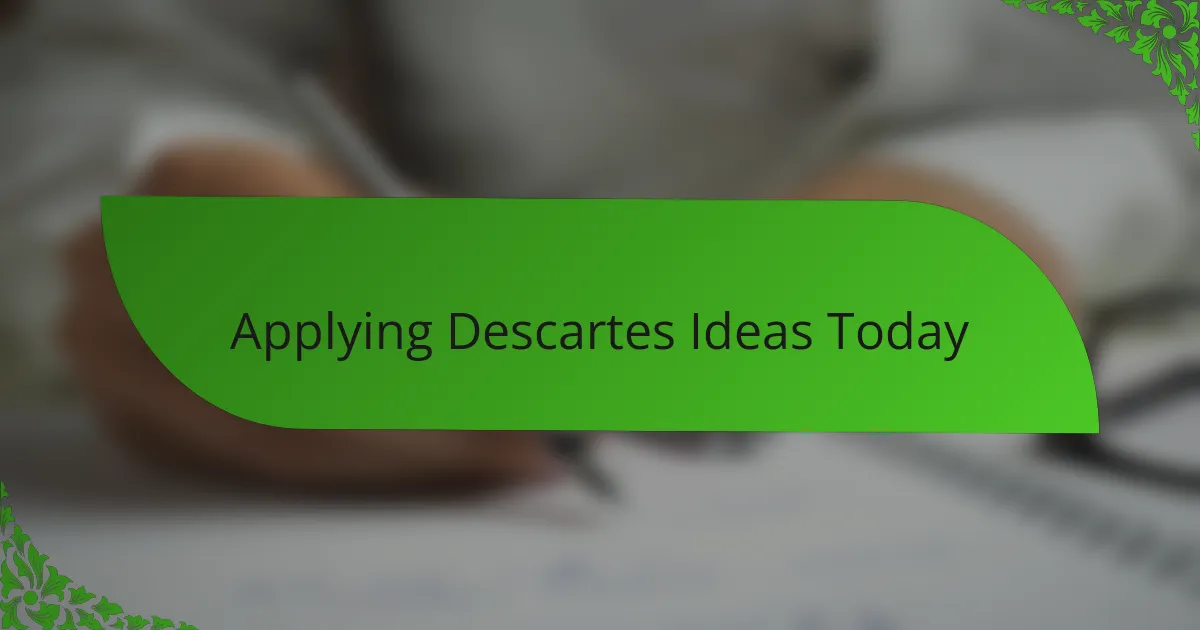
Applying Descartes Ideas Today
Applying Descartes’ ideas today feels surprisingly relevant, especially when I think about how often we accept information without truly questioning it. Have you noticed how quickly we jump to conclusions based on what we hear or see? Embracing a bit of Descartes’ methodic doubt can be a powerful way to pause and reassess, making our beliefs more solid and thoughtful.
In my own life, applying the “Cogito, ergo sum” principle reminded me that my awareness is the starting point for understanding anything else. It’s like saying, before I can be sure of the world, I must be sure of myself—and that brought a new kind of clarity when dealing with uncertainty. Have you ever felt that grounding effect when you focus on what you undeniably know about yourself?
And then there’s Descartes’ mind-body distinction, which nudges me to reflect on how I experience reality—not just physically, but mentally and emotionally. This dualism isn’t just academic; it’s deeply personal. How often do we consider whether our thoughts shape who we are more than the things around us? For me, this question makes everyday experiences richer and more meaningful.
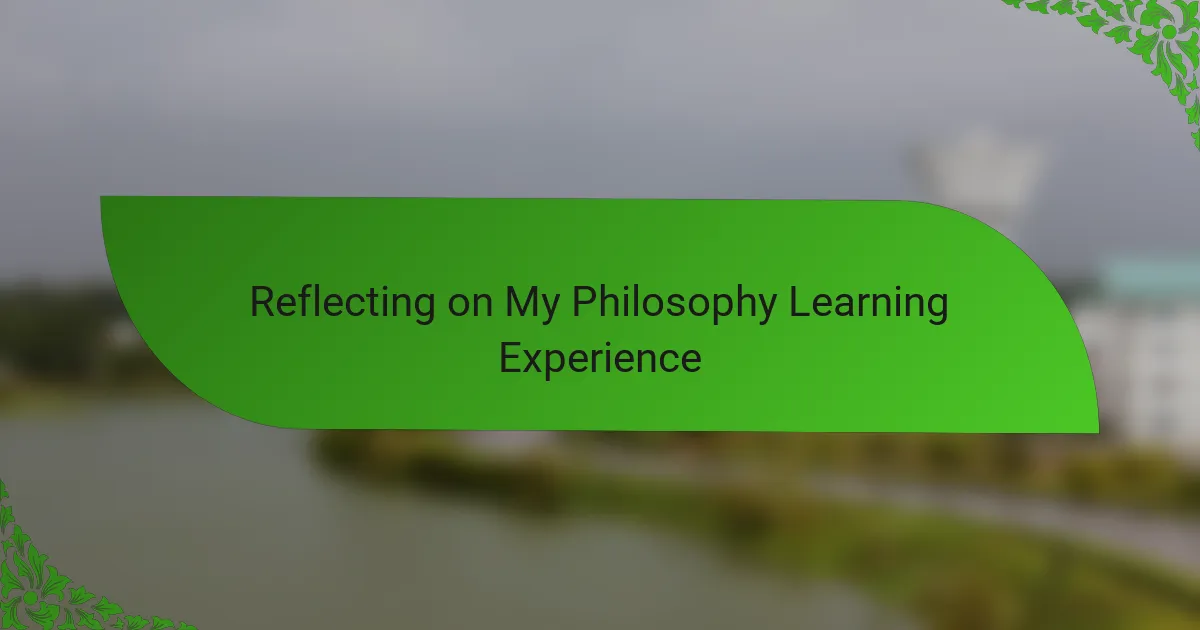
Reflecting on My Philosophy Learning Experience
Looking back on my journey through philosophy, I realize it was more than just acquiring knowledge—it was a transformation in how I approach thinking itself. I often caught myself pausing to question what I’d previously taken for granted, which felt both unsettling and invigorating. Have you ever experienced that moment when learning something new shakes your mental foundation and challenges you to rebuild it stronger?
At times, I was frustrated, especially when grappling with difficult texts like Descartes’ Meditations. Yet, those moments of struggle became the most rewarding, as they forced me to dig deeper and engage actively rather than skim superficially. It felt like the text was inviting me into a conversation, pushing me to wrestle with big ideas rather than passively absorb them.
Reflecting on this process, I see that philosophy isn’t just an academic exercise—it’s an ongoing dialogue with myself that sharpens my perspective and enriches my understanding of the world. How often do we pause in daily life to question our core beliefs? For me, philosophy became a practice in mindful curiosity, a way to live more thoughtfully and deliberately.